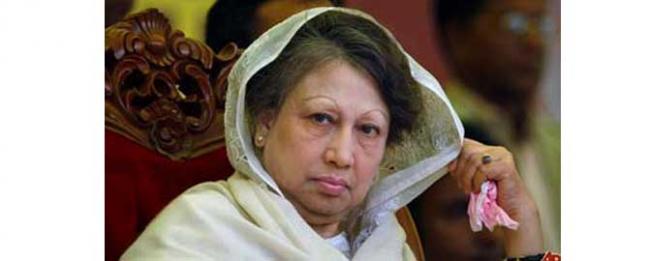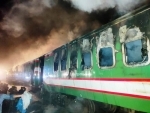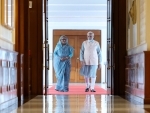Column

Khaleda is unlike her late husband
By Srijato: For the former Prime Minister of Bangladesh Khaleda Zia, Islamists forces led by Jamaat-e-Islami have been her closest allies and friends. So it was not surprising when Khaleda recently lent support to the \'resistance\' put up by the Jamaat-e-Islami against war crime trial. Khaleda even warned the government that the BNP would not tolerate any attack on ‘religion’ or ‘liberty’. She pronounced, “Islam does not contradict independence. But a vested quarter is defaming Islam, Allah and Hazrat Muhammad in the name of implementing the spirit of Liberation War of 1971.” Jamaat which opposed Bangladesh’s birth has once again plunged the country into a spasm of violence as it let loose a fresh wave of deadly clashes in recent months.
Bangladesh’s worst ever period was between 2001-2006, when the BNP-Jamaat combine led by Khaleda Zia was in power. The partnership along with two other smaller allies formed what is known as the four-party alliance that was thoroughly corrupt, encouraged terror groups and pursued radical Islam to target its opponents. Compared to Khaleda, her husband and late President Ziaur-Rahman was no nonsense who did not even spare his own sons and brother-in-law.
During his term as Bangladesh’s President Ziaur Rahman had sacked Khaleda’s brother Syed Iskander (who passed away earlier this year) from Bangladesh Army for his alleged involvement in a number of corruption charges. Syed Iskander, a former BNP MP, was a notorious figure who not only swindled public funds but also maintained close links with Pakistan and ISI. Ziaur Rahman was one of the few honest figures in Bangladesh politics, who did not allow any of the members of his family to make money using state power.
Not only that, Ziaur Rahman was the man, who did not interfere when both of his sons were ousted from St. Joseph School, which is considered one of the most prestigious schools in Dhaka. Zia’s sons were to leave this school because they turned to be extremely inattentive. Tareq and his brother requested their father to readmit them in St. Joseph, when angry Ziaur Rahman said, “I am not in power to support inattentive sons of mine”.
The rule of the Khaled Zia-led four party alliance was remarkable for its misdeeds. Right wing religious extremist terrorism was co-opted as a political factor. The most notable figures was Bangla Bhai and his Jamatul Mujahidin Bangladesh (JMB), and Pakistan’s ISI-backed Harkat-ul-Jihadi Islami (HuJI). These groups were used to terrorize the people. The JMB exploded bombs in a synchronised action in 63 out of 64 districts of Bangladesh in August 2005, the day BNP chairperson and then PM Zia left for her China visit.
While ban on Jamaat was lifted after the assassination of Sheikh Mujibur Rehman and its leaders were allowed to return to Bangladesh when Ziaur Rahman assumed power at Dhaka, the founder of BNP did not promote religion based terror or encouraged terror groups unlike his wife. While Zia increased the role and influence of Islam on the government, he did not encourage radical Islam which his party later did under Khaleda Zia and their son Tareq Rahman. He allowed Jamaat to function under a different name Islamic Democratic League. While giving space to Islam in government has been severely criticized, Ziaur Rahman was a tough administrator ruling the country with iron hands.
Political assassination of Awami League (AL) leaders began to take root during Khaleda’s 2001-06 rule. Three attempts were made on the life of Sheikh Hasina, President of the AL. The 2004 August grenade attack on an AL public gathering in Dhaka severely injured Hasina. The attack killed AL Presidium member Ivy Rahman, wife of recently deceased President of Bangladesh Zillur Rehman, and 21 others. The main culprit, Mufti Hannan, then commander of the HUJI, has confessed to his crime. He also implicated several BNP leaders. The then chief of National Security and Intelligence (NSI) had raised serious questions on Khaleda role in the grenade attack.
The key man of this alliance, Tareq Rahman Zia, elder son of Khaleda Zia and Ziaur Rahman, ran the government for all practical purposes. Pakistan was given a free run of the country to launch terrorist acts in India, did deals with mafia kingpin Dawood Ibrahim. Several terrorist organizations were created affiliated to the Jamaat, ISI and Pakistan. The Jamaat and the BNP actors used the Islamic Bank of Bangladesh, the Ibn Sina Trust and other Jamaat financial organizations to bring in money from NGOs in Gulf to promote terrorism. Bangladesh was on the verge of being declared a state sponsor of terrorism.
The forces opposing the Bengali culture and tradition, were allowed, encouraged and allowed to grow. This compelled Ziaur Rehman’s friend and BNP leader Dr. Badrudozza Chaudhury, to break away to form his Bikalpadhara Bangladesh, and Oli Ahmed, who break ranks with BNP and form LDP.
Khaleda is once again playing the religious card. She had called the nation’s secular youth movement as “perverted” and anti-Islam. She called the police actions to control the violent protests by the Jamaat-Shibir and some BNP cadres as “genocide”.
Khaleda Zia never termed the killing of more than three million Bengalis and rape of more than two hundred thousand Bengali women by the Pakistani army and their Jamaat partners in 1971, as “Genocide”. There were three recorded instances of genocide in the last century. One was the German Nazi extermination of Jews in the “Holocaust”, the 1971 killing and raping of Bangladeshis, and the extermination of almost a third of the Cambodian population by the Khemer Rougue. The Nazi war criminals have been brought to justice, and so have the Khmer Rouge killers like leng Sary and Khieu Sampan among others. And it is time that 1971 war criminals are brought to justice.



